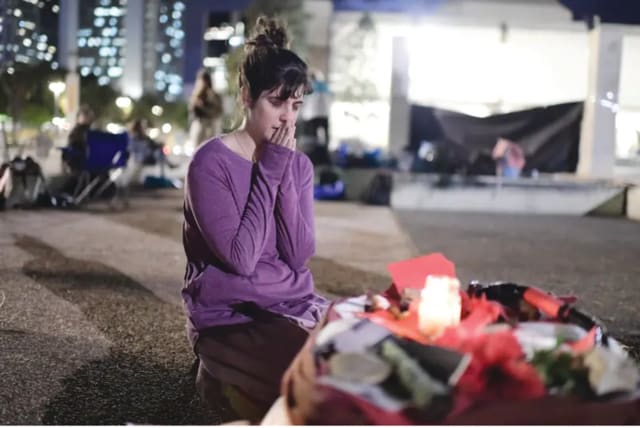Is Israel failing to protect its most vulnerable citizens?

SOCIAL AFFAIRS: 68 violent murders have been carried out in Israeli-Arab communities, four of them against women.
Darya Leitel. Azhar Abu Rabia. Adisi Albana. Baraa Massaroa. These are just four of the 12 women who were murdered in Israel between January 1 and May 1, 2023.
Leitel was strangled to death by her husband while their children slept in the next room. Abu Rabia was killed by her own brother, and Albana’s husband stabbed her multiple times, all while paramedics tried to get into the locked apartment.
And, at 2:34 a.m. on May 1, Massaroa was found dead in her home in Taiba, with her two sons – six-month-old Amir and two-year-old Adam – lying dead next to her.
IN 2022, 24 women were killed in Israel in cases defined as femicide or suspected femicide, an increase from 2021, during which 16 women were killed. And in the first quarter of 2023, the worrying trend seems to continue, with the number of women killed in acts of gender-based violence threatening to rise past the limits of the previous year.
Similarly worrying statistics are emerging from other minority sectors in Israel – namely, the Arab sector. So far this year, 68 violent murders have been carried out in Israeli-Arab communities, four of them against women. Over the 12 months of 2022, 116 murders were recorded in total, indicating that the total number of lives lost in 2023 will be much, much higher.

With one-third of the women who have been murdered so far this year being Israeli-Arab, the link between the rising numbers in both sectors could perhaps serve as an indication of why this is happening.
On December 29, 2022, Israel’s 37th government was sworn into office, and on January 1, 2023, Otzma Yehudit leader Itamar Ben-Gvir assumed the role of National Security Minister, taking over from his predecessor, former national security minister Omer Bar Lev.
Ben-Gvir’s appointment as national security minister was met with concern and fear by women’s organizations and Israeli-Arab organizations alike, with both voicing concerns over his political stances and priorities.
Since taking office, Ben-Gvir has worked to implement several key policies concerning women and Arab-Israelis, while at the same time canceling several others that had been implemented or put forward by the previous government.
Regarding women’s issues, the national security minister decided back in March that the government should vote against a bill that would have required domestic offenders to wear an electronic monitoring bracelet to enforce restraining orders.
The bill, which had been the work of the previous government’s justice minister Gideon Sa’ar and MKs Merav Michaeli, Naama Lazimi and Merav Ben Ari, fell in a vote of 53-54, with Ben-Gvir saying that it was unbalanced and that an amended version of it would be put forward within a month.
While the final details of his new and amended bill have not yet been published, one of the stipulations in it will state that a man must have two previous domestic violence convictions before he can be ordered to wear an electronic tracking bracelet.
Following the March 22 vote, Bat Melech, an NGO that assists religious and haredi women who suffer from domestic violence, said that the rejection of the electronic bracelet bill was “disconnected from the terrible reality of seven femicides since the beginning of the year.”
One of the reasons given by Ben-Gvir for his dissatisfaction with the bill was that he believed it to be unfair to men, and said that it failed to safeguard their rights against women who file false complaints.
“It is important to prevent the possibility of false complaints, which results in harm to innocent men and also to women and their credibility,” he said at the time.
Policies from previous government canceled in recent months
Over in the Israeli-Arab sector, other policies and plans that were put in place by the previous government have been canceled, or adapted and adjusted to the point where their ability to create change has been cast into doubt.Under the Bennett-Lapid government, a budget to the tune of NIS 2.5 billion was allocated to reduce crime in Arab communities in Israel through a government initiative known as the Safe Route program.
The goals of the program included dismantling criminal organizations, raising the sense of personal security in the Arab sector, reducing the number of illegal weapons, increasing the Arab sector’s trust in law enforcement and increasing cooperation with Arab leaders.
While Ben-Gvir initially said that he would personally lead the efforts to continue the Safe Route program under the new government, these efforts quickly failed to materialize, after the national committee of Arab localities said that they would not hold a dialogue with the national security minister and that they opposed “the entrustment of the national program for dealing with crime to a convicted criminal.”
On this topic, Moran Maimoni, codirector of public affairs for the Abraham Initiatives, explained to The Jerusalem Post that not only was the government failing to fill its campaign promises of improving the safety of all citizens, including its Israeli-Arab communities, but that in parts it was actively going against its word.
“Ben-Gvir, for example, ran his campaign on the pledge of fighting violence, particularly in the south of the country, but in the end, not only has he done nothing since the moment he took office, but there are also plans that he has really harmed,” she explained.
“A crucial part of the Safe Route was the building of trust between the government and the Arab leadership, and Ben-Gvir, from the start, arrived in a position where he can’t work with them; they refuse to speak to him. So, essentially, this whole plan that had already been put into motion, to build trust and to work together with the community – all of that has just stopped.”
Progress from last year has reversed in past four months
But can the line really be so clearly drawn between the increased murder rates in the Arab sector and Ben-Gvir taking up office?
“In practice, we are seeing more than two times the number of victims of violent crimes from the start of the year compared to last year,” Maimoni said. “Of course, it is not just Ben-Gvir or the government that has caused this. But we can see that there was an attempt to treat this phenomenon, from which we had begun seeing positive results; we could see that something had started changing.
“It was a program that was supposed to take place over several years, and, of course, the problem wasn’t ever going to be fixed in the space of a year, but we were able to see in the numbers a freeze in the increase of murder victims.
“But now we’re in a new place entirely,” she continued. “We’re talking about numbers without precedent. We haven’t seen numbers like this, so many deaths in such a short time, since the state was founded. It has never been like this.”
Regarding the increase in gender-based murders, many have also pointed to a correlation between the new government and the rise in deaths.
For her part, Maimoni points to the cancellation of the electronic tagging legislation as the clearest example of failure to protect women in Israel.
“There was a law that would have saved lives; it would have, of course, also taken time, and we wouldn’t have seen the results immediately, the day after the law passed. But it was a law that, with time, could have really started to save the lives of women in the country. And Ben-Gvir erased it,” she said.
Others, too, have shone a light on the cancellation of the legislation as one of the government’s biggest rejections of women’s safety.
Following the murder of Massaroa and her two sons, Hadash MK Aida Touma-Sliman, who has been involved with the Women’s Status Knesset Committee since 1992 and has headed it since 2015, placed the blame squarely on the shoulders of the government in general, and of Ben-Gvir specifically.
“The knife used by the murderer was sharpened by the government, which deliberately acts against women, and by the appointed minister [Ben-Gvir], who harms every plan to protect us,” she said scathingly. “There is a clear policy that encourages the current situation. We won’t be led to our deaths quietly, like sheep to the slaughter.”
The urgent need for change that is stressed both by Maimoni and Touma-Sliman is apparent when one examines the statistics concerning the murder rates in both sectors, but is even more so when one steps back to observe the situation among those who live amid the deaths.
A joint project run by the Welfare and Social Affairs Ministry with Israeli news company N12’s Data12 department highlights the systemic issue that is domestic violence in Israel.
According to weekly statistics that were updated as of May 3, 2023, in the last seven days, 67 calls have been made to a domestic violence hotline from women experiencing abuse at the hands of their partners. Additionally, 20 additional women have left their homes in the last week to seek protection at women’s shelters across the country, and 307 children spent part or all of the last week in a shelter with their mothers after a domestic violence situation.
However, Data12 warns in a written message, these numbers may not be exact, and the actual count could be higher. This is due to the fact that, currently, “there is no government body entrusted with the collection and analysis of data on murder and violence against women. There are no official numbers on the subject.”
In the Arab sector, it is much the same story. While no official data exist, there is no escaping the fear that permeates the community.
“We look at the number of victims and the number of dead, but we need to be speaking about the number of people injured, those impacted mentally, and children who go to sleep each night with the sound of gunshots in the streets, which have already become routine background noise in their everyday lives,” Maimoni said.
“I wake up in the morning with the sound of birds outside my window; they go to sleep with the sound of gunshots outside of theirs.”
While the question of whether these statistics would still look the same today had the previous government, with its plans to quell Arab sector violence and to protect women from abuse, continued may not have a clear-cut answer, some things are more obvious than others.
“I’m not able to say what would have been, but I know that there are several things that need to happen,” said Maimoni.
“The electronic cuff law was going to protect women who live under threat in their own homes, and [Ben-Gvir] canceled it,” she added.
“It was the responsibility of the minister; it was the responsibility of the state; and we can see, both in this instance and in the instance of [treating Arab sector violence], things aren’t happening. The issues are not being treated.”
“The state’s job, their first and most important role, is to care for the personal safety of its citizens.”
